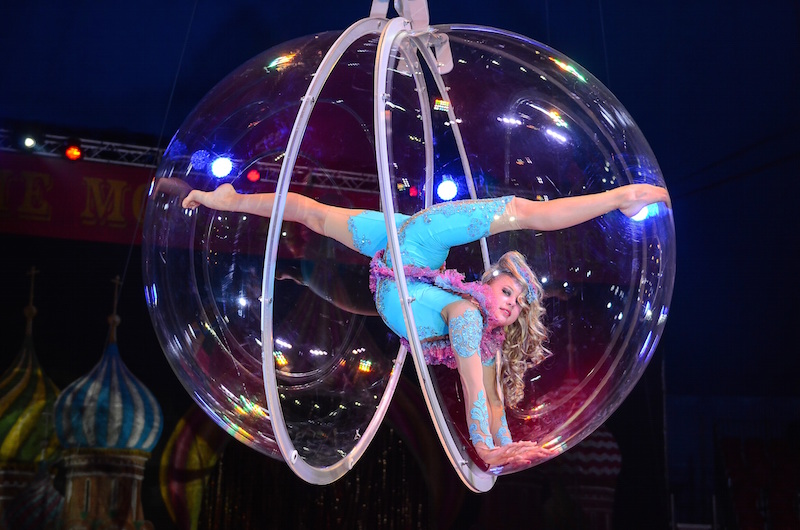Merry Hill, Dudley; 9th July 2015
 Moscow State Circus have a reputation as one of the grandest circus institutions in the country. Produced by EEC, the technical quality of the skills on show is indeed very high, but the artistic direction of the production is a disappointment.
Moscow State Circus have a reputation as one of the grandest circus institutions in the country. Produced by EEC, the technical quality of the skills on show is indeed very high, but the artistic direction of the production is a disappointment.
There is a disjointedness to the scattered events, at odds with the clarity of branding and professionalism that mark the site. Smart yellow wagons include splendid toilet facilities, and the red-capped white tents – that house both concession lobby and the performance ring – are fitted with the most comfortable seats I’ve ever sat in at a tenting circus!

Based on a Russian folktale, Zhelaniy returns us time and again to a central figure of a girl in a blue dress (Kushka Veslovskiy) who has been granted seven flowers for seven wishes by an eccentric old man who must also be a sort of genie (Vladimir Georgievsky). Occasionally the acts that make up the body of the show feed into this narrative – such as the ‘bubbles that will never pop’, or the wish for a pair of rollerskates. Most of the time, however, they are bewilderingly disconnected, neither following the drift of a story, nor introduced as stand-alone numbers often expected in a big top presentation.
Now and again there’s a whiff of Cirque Du Soleil’s whimsy, but only at a surface level, with none of the internal logic or heart that allows a Cirque world to breathe. The performers shine in the technical elements of their individual numbers, but look like marionettes having their strings pulled in the extra staging that surrounds them.
The intonation of the Little Girl is flat and expressionless, and the moral of the story is pummelled home by a clunky declaration at the end of the show, rather than becoming clear through progressive events.

Some of the acts are remarkable; Tatiana Ozhiganova, dressed in a red evening gown, is elegance personified as she performs a graceful routine on a single aerial strap, incorporating a small folk accordion as a prop; Olga Rozhkovskaya is an accomplished wire dancer, with assured footwork and a powerful, confident smile; the award-winning Eliza Khachatryan goes one step further, performing on the high wire en pointe, with a wind machine ruffling her white skirts and fanning her hair.
The Russian bar acrobatics from the Stynka Trio are slick, incongruous to the awkward slow motion slapstick they dress their number with. It actually seems to be a staged pratfall dismount that causes the flyer an injury and cuts the routine short – perhaps, had it continued, it would have become more cohesive, as in this performance from last year when the group was four-strong.

There is poeticism from the Atlas Trio (3 ‘K’ in the programme), a trio of contortionists who perform matching choreography above our heads in giant perspex bubbles, splitting them open to hang and extend their stretches before retuning to their isolated havens. It’s an interesting take on the ‘contortionist in a bottle’ classic, and is one of the few moments that gels naturally with the storyline and preceding action.

Another is the roller-skating of the ‘Ehilarators’, featuring the Veslovskiys, and another two uncredited performers. Styled with a nod to Starlight Express, the four work first as separate pairs, then simultaneously, and then as a foursome, finally utilising a shoulder-slung contraption between the two men that allows both ladies to neck spin as the four rotate around the platform to an energising electro soundtrack.
The score is great throughout, blending snatches of familiar refrains with Russian folk, although the abrupt jumps from one pace and style to another could benefit from some smooth transitioning.

Clowning is provided by Natalia Mentenseva – who is easily the most charismatic and charming person onstage as disco-granny charlady The Cleaner – and Georgievsky as the tramp-like font of wishes, Professor Wacko. He truly comes into his own during a fast and funny slapstick solo with a diving board and hidden trampoline ‘pool’, unleashing shades of Robin Williams with his greying hair and boyish energy.
Ensemble acrobatics come from the Ruban Troupe, who present a Russian Swing set in the first half, and a teeterboard act in the second. They are precise and daring, but there is a disconnect between their themed performance and the thread of the evening’s show. Twisting somersaults, a chair perch and stilted teeterboard manoeuvres are exciting in themselves, but the whiteface Pierrot stylings seem self-conscious and out of place. (I googled the troupe, and there is a far superior version of their act, from 2013, here.)
 I’ve enjoyed watching the skill levels of the artists here tonight, but feel they could have been given a better vehicle within which to carry them off. The final straps duo which could have leant some weight to the ending of the tale was token and, even though this is a family show, even kids don’t need their moral lessons rammed down their throats this hard. Fairy tales, when allowed to run their own course, provide their own inherent teaching.
I’ve enjoyed watching the skill levels of the artists here tonight, but feel they could have been given a better vehicle within which to carry them off. The final straps duo which could have leant some weight to the ending of the tale was token and, even though this is a family show, even kids don’t need their moral lessons rammed down their throats this hard. Fairy tales, when allowed to run their own course, provide their own inherent teaching.





